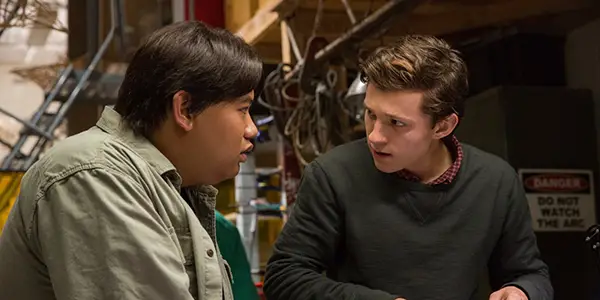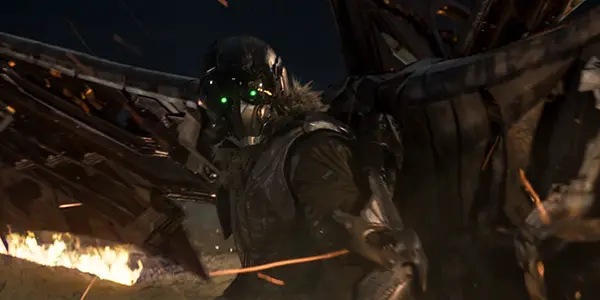SPIDER-MAN: HOMECOMING: Fun & Lighthearted But Disrupted By Its Link To The MCU

David is a film aficionado from Colchester, Connecticut. He enjoys…
Back in early 2015, a huge announcement hit the nerd inter-webs: Spider-Man was going to be joining the Avengers! In an already established Marvel Cinematic Universe, Spider-Man would be first introduced in last year’s Captain America: Civil War, followed by his own outing the following year. Now, finally, we have our first standalone Spider-Man film (not including the previous five movies, which are not considered canon in our current Marvel universe).
Understandably, it may be a bit confusing as to where exactly this current film fits in, especially if not a meticulous follower of the Marvel series thus far. Either way, Spider-Man: Homecoming does offer at least something for fans of the comic hero to enjoy. Tom Holland shines as the teenaged Spider-Man, and the cast, which includes the likes of Marisa Tomei and Michael Keaton, is brimming with talent. The film is also much funnier than previous outings with the character. It’s a real shame, then, that it also gets bogged down by an incessant need to connect to the wider universe around it.
High School Or Crime Fighting?
Spider-Man: Homecoming takes place immediately following the events of Captain America: Civil War. In that film, Peter Parker a.k.a. Spider-Man fought alongside Iron Man and others against the renegade Captain America, who ends up on the wrong side of the law after refusing to sign a superhero mandate. Now, after having proven himself in that fight (so he believes), Peter is eagerly awaiting an invite from the Avengers to join their team.
Months go by, though, without any reply to his constant texts and phone calls. Eager to prove himself yet again, Peter soon finds himself wrapped up in a villainous plot by one Adrian Toomes a.k.a. the Vulture, who, after acquiring alien technology, has created a black market for the criminals of New York to receive dangerous weapons.
It must have initially seemed a monumental task to bring a new Spider-Man to the screen. As the third reboot in the last 15 years, Kevin Feige and crew had to somehow distinguish this present incarnation from either of those series. They had already accomplished this in part by first introducing the character in Captain America: Civil War, in which he was already established as a kid with superpowers. So, thankfully, Homecoming would not be yet another origin story for him.

Even more important, though, the film had to feel fresh. And, on this ground, Homecoming succeeds. As opposed to the huge, special effects-driven arcs of past superhero entries, director Jon Watts attempts to slow down this current outing, making it feel much like a classic John Hughes story, albeit with a superhero angle. By also making Peter Parker younger, the film becomes much closer to a coming-of-age story than any of his past films. It succeeds at its best when it simply allows us to relish in the idea of a 15-year-old kid gripping with the pains of adolescence while also coming to understand the self-sacrificial ideal of being a superhero.
Spider-Man: Homecoming is also very self-aware as to its influences. In one of its more entertaining sequences, Peter flies and stumbles through peoples’ backyards in his attempt to thwart a crime taking place; stopping for a second at each one to say hi or make a snide comment on the current goings-on. It’s a direct homage to the ending sequence of Ferris Bueller’s Day Off (the scene of which is actually shown on a TV directly following). Additional influences are of past Spider-Man films, including a scene on a ferry which is reminiscent of the train scene from Spider-Man 2, and a villain who is also reminiscent of Norman Osbourne in the first Spider-Man.
The film is also helped along by boyishly charming Tom Holland, who lit up the screen in last year’s Captain America: Civil War despite only being present for about 20 minutes of screen time. Here, he’s given an entire film to show even more of his acting chops. Though actually 21 years old, Holland easily passes for a 15-year-old, not only through his looks but by managing to aptly capture the angst and awkwardness of youth.
Some of the film’s best scenes are when Peter and best friend Ned (Jacob Batalon) try to be normal kids, attending parties where they’re the odd ones out, attempting to talk to girls, and going to dances. There are even more ripe moments for comedy when Ned discovers Peter’s secret identity, insisting on becoming his loyal sidekick in all his crime-fighting adventures.
Yet It’s An Avengers Film
As the sixteenth film in the wider Marvel Cinematic Universe, Spider-Man: Homecoming takes place in a clearly established superhero world. And though Jon Watts and his screenwriters valiantly show restraint in peppering in outside characters, it still doesn’t quite distinguish itself enough from the larger series.
Indeed, even the villainous plot by Michael Keaton‘s Vulture comes directly from the aliens that were killed after the events of The Avengers. But even more blatant is the ever-wavering presence of Iron Man, who comes in multiple times to save the day when Peter inevitably screws up. Robert Downey, Jr., who is typically a delight in this series, at this point seems to have overstayed his welcome with his constant overshadowing of the film’s events.

The issue here is not that the film is connected to a larger series, it’s that these strands prevent it from standing on its own two feet. The underlying problem may have been that the directors introduced the character this far along, when a multitude of films have already been established as canon, but even an acknowledgment of the outside world shouldn’t prevent the film from being enjoyable on its own.
Think back to Ant-Man, for example. The film establishes itself in the Avengers world, and even includes a couple characters from that series at one point, but at its heart it’s a redemptive story of a criminal attempting to make something of himself in order to earn the respect of his estranged daughter (and his own self-respect). If you saw Ant-Man on its own without having seen any Marvel films prior, it would still be just as enjoyable.
Spider-Man: Homecoming, though, is a different story. Its connections to the Avengers world are not only ever-present, but they are the very essence of its story. The overarching theme attempting to present itself is that Peter is a naive kid who eventually realizes he can do good on his own as a friendly neighborhood Spider-Man as opposed to being part of something larger than himself.
Though the message ultimately does succeed, it’s also just not quite enough to distinguish Spider-Man: Homecoming as an engaging individual film as opposed to simply yet another entry in a larger saga. Perhaps the Marvel world has just gotten too big for its own good at this point, which made me long for the past when a superhero movie could exist in its own world without the constant need to link it to others.
Generic Story And Action
Something I had heard through multiple sources in advance of seeing Spider-Man: Homecoming is that Michael Keaton‘s Vulture is among the better Marvel villains. The word I had always seen in reference was that he seemed to be a legitimate “threat.” After seeing the film, though, I’m perplexed as to why people seem to think this.
Adrian Toomes is the product of a politicized world, and is what you would get if people at the bottom decided to lash out against a world that they feel has neglected them. He’s a character that is ripe with potential as a result, and Keaton, not a stranger to the superhero genre, does get a few opportunities to express the character’s menacing and sneerish attitude.
What seemed to be lacking, then, is a complete lack of backstory and character development for him. He is presented as a potential bad guy in an early scene, then suddenly has an established criminal underworld. There is nothing approaching the steady transformation of a character like Willem Dafoe‘s Norman Osbourne in the first Spider-Man or Dr. Octopus in Spider-Man 2.
In addition, his entire scheme is simply the following: selling weapons to bad guys. For what purpose? There didn’t need to be a huge world-ending plot like there is in a lot of these films, but there needed to be something potentially devastating at least in the not-too-distant future for the story to have a sense of desperation.
Further, the wider cast of Spider-Man: Homecoming is similarly wasted. Marisa Tomei is given little screen time as the newer, younger version of Aunt May, while actors such as Donald Glover, Zendaya, Bokeem Woodbine, and Hannibal Buress have mere minutes at the most. It’s odd, to me, to give such widely established talent such little time to express their acting chops; in a way, it makes their presence in the film seem like nothing more than a way to establish big names in the film’s promotions.

Finally, it should be noted that this is an action movie. And though there are some fine set pieces, including a rather acrophobic-inducing climb and elevator save on top of the Washington monument and a frantic fight on a New York ferry, there are also some that are extremely bland, such as the final sequence upon an airplane filled with alien weapons. That fight, which is both anticlimactic and riddled with dull CGI, ends the film on a somewhat sour note, which was unfortunate considering it was just teetering on the edge of passable up until that point.
Conclusion
To conclude, Spider-Man: Homecoming is neither a full disappointment nor a complete triumph. Though it does establish the newest Spider-Man as a character to look out for, and contains some fine performances, especially by Tom Holland, it is also undermined by some uninspired action and an unwavering desire to firmly connect itself to the wider Marvel world. Spider-Man may eventually have a place in the Marvel Cinematic Universe, but he has to have more interesting adventures than this current outing in order to fully snag me in for future films.
What did you think of Spider-Man: Homecoming? Do you think the character works as part of the Marvel Cinematic Universe?
Spider-Man: Homecoming is now released in the US and the UK. For all international release dates, click here.
Does content like this matter to you?
Become a Member and support film journalism. Unlock access to all of Film Inquiry`s great articles. Join a community of like-minded readers who are passionate about cinema - get access to our private members Network, give back to independent filmmakers, and more.
David is a film aficionado from Colchester, Connecticut. He enjoys writing, reading, analyzing, and of course, watching movies. His favorite genres are westerns, crime dramas, horror, and sci-fis. He also enjoys binge-watching TV shows on Netflix.













